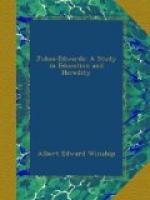Mr. Edwards has gone into history as a theologian of the most stalwart character. It is undeniable that he preached the most terrific doctrine ever uttered by an American leader, but this was only the logical result of the intellectual projection of his effort to make sacrifices in order to benefit humanity. As a child he sacrificed everything for health and virtue that he might have influence, and as a man he knew no other plan or purpose in life. His masterpiece is upon the “will” which he developed to the full in himself.
The greatest religious awakening that the Western world has ever known was started in his church at Northampton, not over ecclesiastical differences, or theological discussion but over a question of morality among the young people of the town. It had to do with the impropriety of the young ladies entertaining their gentlemen friends on Sunday evenings and especially of their allowing them to remain to such unreasonable hours. And the issue which ultimately drove him from his pastorate, after twenty-five years of service, by an almost unanimous vote was not one of ecclesiasticism or theology, but of morals among the young people. He insisted upon vigorous action in relation to the loose and as he thought immoral reading of the youth of the town. As this involved some prominent families he had to retire from the pastorate.
The views of Mr. Edwards on pastoral work reveal the singleness of purpose of the man as a student and thinker. He never made pastoral calls. He had no criticism to make of those pastors who had talent for entertaining people by occasional calls, but as he had no gifts in that direction he regarded it advisable to use his time in cultivating such talents as he had. Whoever wished to talk with him about personal, moral or religious conditions found in him a profitable counsellor. In his preaching, which was equal to anything America has ever known, he made no attempt to win his hearers by tricks of oratory or by emotional appeals, though he had a most fascinating personality. He was six feet in height, slender in form, with a high, broad forehead, eyes piercing and luminous and a serene countenance. In the pulpit he was graceful, easy, natural and earnest, though he had little action. He rested his left elbow on the pulpit and held his manuscript in his left hand while with his right he turned the leaves. In him were combined the intellectual and moral vigor which are calculated to make the progenitor of a great family.




